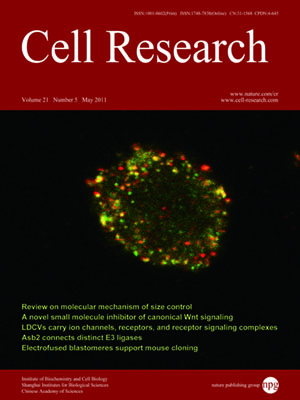
Volume 21, No 5, May 2011
ISSN: 1001-0602
EISSN: 1748-7838 2018
impact factor 17.848*
(Clarivate Analytics, 2019)
Volume 21 Issue 5, May 2011: 807-816
ORIGINAL ARTICLES
Regulation of REGγ cellular distribution and function by SUMO modification
Yan Wu1,*, Lu Wang1,*, Ping Zhou1, Guangqiang Wang1, Yu Zeng1, Ying Wang1, Jian Liu1,3, Bianhong Zhang1, Shuang Liu1, Honglin Luo2 and Xiaotao Li1,3
1Institute of Biomedical Sciences, East China Normal University, 500 Dongchuan Road, Shanghai 200241, China
2The James Hogg iCAPTURE Centre for Cardiovascular and Pulmonary Research, University of British Columbia-St Paul's Hospital, 1081 Burrard Street, Vancouver, Canada V6Z 1Y6
3Department of Molecular and Cellular Biology, Baylor College of Medicine, One Baylor Plaza, Houston, TX 77030, USA
Correspondence: Xiaotao Li,(xiaotaol@bcm.edu)
Discovery of emerging REGγ-regulated proteins has accentuated the REGγ-proteasome as an important pathway in multiple biological processes, including cell growth, cell cycle regulation, and apoptosis. However, little is known about the regulation of the REGγ-proteasome pathway. Here we demonstrate that REGγ can be SUMOylated
in vitro and
in vivo by SUMO-1, SUMO-2, and SUMO-3. The SUMO-E3 protein inhibitor of activated STAT (PIAS)1 physically associates with REGγ and promotes SUMOylation of REGγ. SUMOylation of REGγ was found to occur at multiple sites, including K6, K14, and K12. Mutation analysis indicated that these SUMO sites simultaneously contributed to the SUMOylation status of REGγ in cells. Posttranslational modification of REGγ by SUMO conjugation was revealed to mediate cytosolic translocation of REGγ and to cause increased stability of this proteasome activator. SUMOylation-deficient REGγ displayed attenuated ability to degrade p21
Waf//Cip1 due to reduced affinity of the REGγ SUMOylation-defective mutant for p21. Taken together, we report a previously unrecognized mechanism regulating the activity of the proteasome activator REGγ. This regulatory mechanism may enable REGγ to function as a more potent factor in protein degradation with a broader substrate spectrum.
Cell Research (2011) 21:807-816. doi:10.1038/cr.2011.57; published online 29 March 2011
FULL TEXT | PDF
Browse 2198


